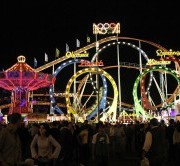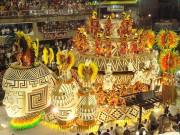Oktoberfest or “d’ Wiesn” to the locals
To help you survive this annual German festival we have come up with some essential phrases and vocabulary…
Every year over 6 million people flock to the city of Munich in Germany to be part of the world famous German festival, Oktoberfest. And what exactly do you do? Drink beer from 6 of Munich’s brewers for 16 days! However, there are plenty of other things to do in this charming city in southern Germany, such as trying the delicious local food and taking a ride on the world’s largest portable rollercoaster!
Finally, if you really want to join in the festivities, why not try dressing up? Ladies traditionally wear a Dirndl, which is a Bavarian dress with an apron, and men wear a Lederhosen, which are leather shorts with embroidery.
Impress the locals with our top 10 Oktoberfest phrases and vocabulary!
| ENGLISH | GERMAN |
| Hello my name is….what is your name? | Hallo, ich heiße ….. Wie heißt du? – (Great way to make new friends!) |
| Another beer please | Noch ein Bier, bitte. |
| I need a re-fill, please! | Nachschenken, bitte! |
| It’s tapped! | O’zapft is! (b) |
| I want to buy beer tokens | Ich möchte Biermarken kaufen |
| Which way is the Wiesn? (Large field where Oktoberfest takes place) | Wo geht es zur Wiesn? |
| Next round is on him/her! | Die nächste Runde zahlt er/sie! |
| Cheers! | Prost! |
| One, two, drink! | Oans, Zwoa, Gsuffa! (b) |
| ENGLISH | GERMAN |
| Rollercoaster | die Achterbahn |
| Beer tent | das Bierzelt |
| Family day (prices are cheaper) | der Famillientag |
| Waiter/Waitress | die Bedienung |
| Sausage | die Wurst |
| Beer mug | der Bierkrug |
| Pretzel | die Brezel |
| Ticket | die Fahrkarte |
| Music | die Musik |
| Bartender | der Wirt |
(b) indicates that it is in Bavarian German
If you find yourself wanting to expand on your vocabulary, also visit www.oktoberfest.de for a whole dictionary of essential Oktoberfest words.
Cactus specialises in organising language courses for individuals and groups, having done so since 1999 for clients all over the globe and for diverse needs and budgets. Our expertise in the field of face-to-face tuition is second-to-none. With an extensive network of approved teachers and a strong in-house academic team, we are able to tailor a language course to suit your specific learning needs, anywhere in the world and whenever is convenient to you.








